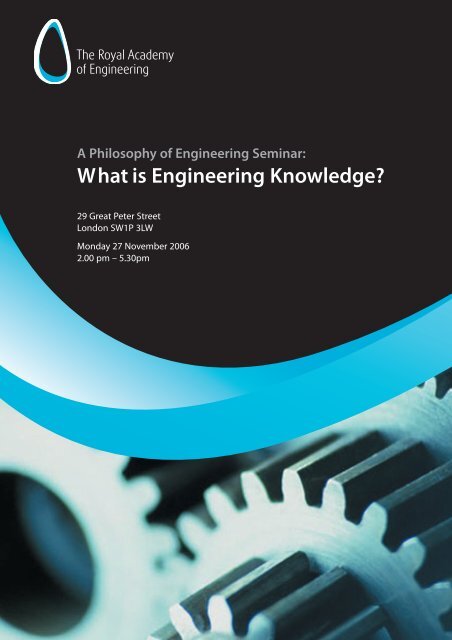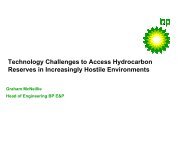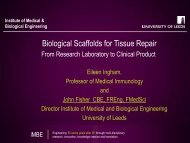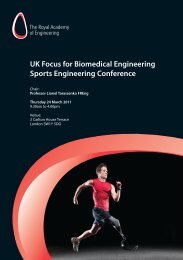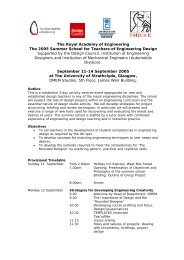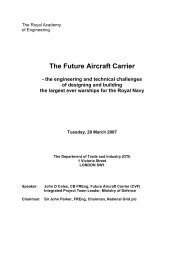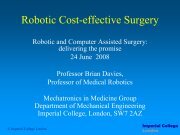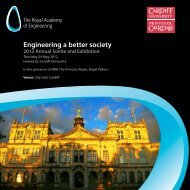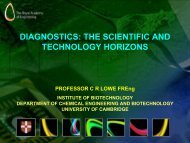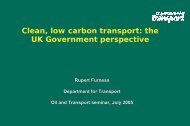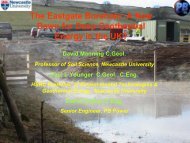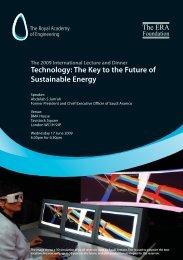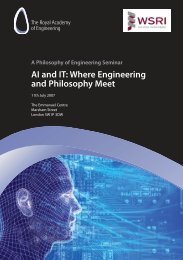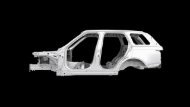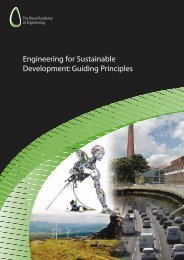What is Engineering Knowledge? - Royal Academy of Engineering
What is Engineering Knowledge? - Royal Academy of Engineering
What is Engineering Knowledge? - Royal Academy of Engineering
You also want an ePaper? Increase the reach of your titles
YUMPU automatically turns print PDFs into web optimized ePapers that Google loves.
A Philosophy <strong>of</strong> <strong>Engineering</strong> Seminar:<br />
<strong>What</strong> <strong>is</strong> <strong>Engineering</strong> <strong>Knowledge</strong>?<br />
29 Great Peter Street<br />
London SW1P 3LW<br />
Monday 27 November 2006<br />
2.00 pm – 5.30pm
<strong>What</strong> <strong>is</strong> <strong>Engineering</strong> <strong>Knowledge</strong>?<br />
Th<strong>is</strong> <strong>is</strong> the first in a series <strong>of</strong> public seminars on the philosophy <strong>of</strong> engineering run by The<br />
<strong>Royal</strong> <strong>Academy</strong> <strong>of</strong> <strong>Engineering</strong>. The series aims to explore philosophical <strong>is</strong>sues that ar<strong>is</strong>e in<br />
engineering research and practice. Th<strong>is</strong> seminar will examine the nature <strong>of</strong> engineering<br />
knowledge, addressing questions such as: <strong>What</strong> are the intellectual foundations <strong>of</strong><br />
engineering? <strong>What</strong> <strong>is</strong> engineering knowledge, and what <strong>is</strong> it to have engineering<br />
knowledge? <strong>What</strong> can philosophers learn from engineering about knowledge? Do<br />
engineering and science share a common goal in the quest for knowledge, and do they<br />
make equal contributions to our knowledge <strong>of</strong> the natural world?<br />
Future seminars will be held on the following topics: systems engineering and engineering<br />
design; AI and IT – where philosophy and engineering meet; metaphysics and engineering;<br />
engineering and environmental philosophy; education and the philosophy <strong>of</strong> engineering.<br />
Pr<strong>of</strong>essor Peter Lipton<br />
Peter Lipton <strong>is</strong> the Hans Rausing Pr<strong>of</strong>essor and Head <strong>of</strong> the Department <strong>of</strong> the H<strong>is</strong>tory and<br />
Philosophy <strong>of</strong> Science at the University <strong>of</strong> Cambridge and a Fellow <strong>of</strong> King's College. H<strong>is</strong><br />
philosophical interests include the structures <strong>of</strong> explanation and inference in science, the<br />
nature <strong>of</strong> scientific progress, social ep<strong>is</strong>temology, the relation between science and religion,<br />
and biomedical ethics. Selected publications are available at:<br />
www.hps.cam.ac.uk/dept/lipton.html<br />
<strong>Engineering</strong> and Truth: One <strong>of</strong> the central questions in the philosophy <strong>of</strong> science <strong>is</strong> whether<br />
science <strong>is</strong> in the truth business: whether science <strong>is</strong> producing increasingly accurate and<br />
comprehensive representations <strong>of</strong> a largely unobservable world. On the positive side, there <strong>is</strong><br />
the striking predictive success <strong>of</strong> our best scientific theories. On the negative side there <strong>is</strong> the<br />
h<strong>is</strong>tory <strong>of</strong> science, a h<strong>is</strong>tory <strong>of</strong> theories which were predictively successful for a time but were<br />
later found to be fundamentally m<strong>is</strong>taken. Th<strong>is</strong> debate over truth has focused on pure science;<br />
we need to consider how the situation changes if we focus instead on engineering.<br />
Dr Kieron O’Hara<br />
Kieron O’Hara <strong>is</strong> a senior research fellow in Electronics and Computer Science at the University<br />
<strong>of</strong> Southampton, with particular interests in the technology and politics <strong>of</strong> knowledge. He <strong>is</strong><br />
the author <strong>of</strong> ‘Plato and the Internet’, ‘Trust: From Socrates to Spin’, ‘After Blair: Conservat<strong>is</strong>m<br />
Beyond Thatcher’, ‘The Referendum Roundabout’ and ‘inequality.com: Power, Poverty and the<br />
Digital Divide’, and has written a long review <strong>of</strong> the science <strong>of</strong> the web with Sir Tim Berners-Lee.<br />
H<strong>is</strong> next book (Feb 07) <strong>is</strong> a study <strong>of</strong> David Cameron, and he <strong>is</strong> currently writing a book with<br />
Pr<strong>of</strong>essor Nigel Shadbolt on technology and privacy.<br />
Plato and the Internet: Technological developments such as the World Wide Web and<br />
e-science have led to an explosion in the amount <strong>of</strong> knowledge to which we have access. At<br />
the same time, economic imperatives are driving us to exploit the competitive advantage that<br />
knowledge provides. But the study <strong>of</strong> knowledge – ep<strong>is</strong>temology – does not reflect these<br />
developments, and addresses problems that are fundamentally those that Plato addressed in
h<strong>is</strong> ep<strong>is</strong>temological works: knowledge <strong>is</strong> seen as a capacity character<strong>is</strong>tic <strong>of</strong> human beings, and<br />
the major <strong>is</strong>sue to be addressed <strong>is</strong> sceptic<strong>is</strong>m.<br />
But th<strong>is</strong> framework does not provide useful support in the engineering and technological<br />
context. Rather, we need to understand that knowledge can be held and acted upon by other<br />
agents than humans, including animals, computers, systems and organ<strong>is</strong>ations. In th<strong>is</strong> context,<br />
the fundamental problem <strong>of</strong> ep<strong>is</strong>temology <strong>is</strong> how any agent extracts information from its<br />
environment and acts upon it.<br />
Pr<strong>of</strong>essor Sir Tony Hoare FREng FRS<br />
Tony Hoare took a degree in Lit. Hum. from Oxford University in 1956. As an undergraduate, he<br />
was inspired by h<strong>is</strong> philosophy tutor John Lucas to pursue h<strong>is</strong> interests in symbolic logic and<br />
computing. H<strong>is</strong> working career started in 1960 as a computer programmer with a small Brit<strong>is</strong>h<br />
computer manufacturer, and since 1999 he has been a computer researcher at Micros<strong>of</strong>t<br />
Research Ltd. Cambridge. In between, he had a d<strong>is</strong>tingu<strong>is</strong>hed academic career at the Queen’s<br />
University, Belfast and at Oxford University, and set up the first computing degree programmes<br />
in both universities. H<strong>is</strong> long-term research goal has been to place the engineering <strong>of</strong> s<strong>of</strong>tware<br />
on a firm bas<strong>is</strong> <strong>of</strong> scientific theory.<br />
The Logic <strong>of</strong> <strong>Engineering</strong> Design: Th<strong>is</strong> seminar will describe the speaker’s philosophy <strong>of</strong> the<br />
specification, design and implementation <strong>of</strong> s<strong>of</strong>tware products and services. It will show how<br />
the justification for the correctness <strong>of</strong> designs and implementations can be given by<br />
elementary logical reasoning – in fact by propositional logic.<br />
Schedule (All talks will be followed by a short question session):<br />
2.00pm: Dr Keith Guy FREng: Chair’s introduction<br />
2.05pm: Pr<strong>of</strong>essor Peter Lipton: ‘<strong>Engineering</strong> and Truth’<br />
2.55pm: Pr<strong>of</strong>essor Sir Tony Hoare FREng FRS: ‘The Logic <strong>of</strong> <strong>Engineering</strong> Design’<br />
3.45pm: Break for c<strong>of</strong>fee<br />
4.00pm: Dr Kieron O’Hara: Plato and the Internet: Liberating <strong>Knowledge</strong> from Our Heads’<br />
4.50pm: Panel d<strong>is</strong>cussion<br />
5.25pm: Closing remarks by the Chair<br />
For further information, please contact Dr Natasha McCarthy at<br />
natasha.mccarthy@raeng.org.uk or tel. 020 7227 0575
M<strong>is</strong>s S Hearn<br />
The <strong>Royal</strong> <strong>Academy</strong> <strong>of</strong> <strong>Engineering</strong><br />
29 Great Peter Street<br />
LONDON<br />
SW1P 3LW
<strong>What</strong> <strong>is</strong> <strong>Engineering</strong> <strong>Knowledge</strong>?<br />
Reg<strong>is</strong>tration Form<br />
I w<strong>is</strong>h to reserve ……… places for the seminar<br />
Title<br />
First name<br />
Surname<br />
Position<br />
Organ<strong>is</strong>ation<br />
Address<br />
Postcode<br />
Telephone<br />
Email<br />
Guest<br />
Title<br />
First name<br />
Surname<br />
Position<br />
Organ<strong>is</strong>ation<br />
The <strong>Academy</strong> <strong>is</strong> keen to receive feedback on the value <strong>of</strong> its activities. Please<br />
tick th<strong>is</strong> box if you are content for us to contact you by email after th<strong>is</strong> event<br />
as part <strong>of</strong> our evaluation programme. Please also ensure that we have your<br />
correct email address.<br />
Please return to:<br />
M<strong>is</strong>s S Hearn<br />
The <strong>Royal</strong> <strong>Academy</strong> <strong>of</strong> <strong>Engineering</strong><br />
29 Great Peter Street, London SW1P 3LW<br />
Tel: 020 7227 0519<br />
Email: sylvia.hearn@raeng.org.uk
The <strong>Royal</strong> <strong>Academy</strong><br />
<strong>of</strong> <strong>Engineering</strong><br />
As Britain’s national academy for engineering, we bring together the country’s<br />
most eminent engineers from all d<strong>is</strong>ciplines to promote excellence in the<br />
science, art and practice <strong>of</strong> engineering. Our strategic priorities are to enhance<br />
the UK’s engineering capabilities, to celebrate excellence and inspire the next<br />
generation, and to lead debate by guiding informed thinking and influencing<br />
public policy.<br />
The <strong>Academy</strong>’s work programmes are driven by three strategic priorities, each<br />
<strong>of</strong> which provides a key contribution to a strong and vibrant engineering<br />
sector and to the health and wealth <strong>of</strong> society.<br />
Enhancing national<br />
capabilities<br />
As a priority, we encourage,<br />
support and facilitate links<br />
between academia and industry.<br />
Through targeted national and<br />
international programmes, we<br />
enhance – and reflect abroad –<br />
the UK’s performance in the<br />
application <strong>of</strong> science,<br />
technology transfer, and the<br />
promotion and exploitation <strong>of</strong><br />
innovation. We support high<br />
quality engineering research,<br />
encourage an interd<strong>is</strong>ciplinary<br />
ethos, facilitate international<br />
exchange and provide a means<br />
<strong>of</strong> determining and<br />
d<strong>is</strong>seminating best practice. In<br />
particular, our activities focus on<br />
complex and multid<strong>is</strong>ciplinary<br />
areas <strong>of</strong> rapid development.<br />
Recogn<strong>is</strong>ing excellence<br />
and inspiring the next<br />
generation<br />
Excellence breeds excellence.<br />
We celebrate engineering<br />
excellence and use it to inspire,<br />
support and challenge<br />
tomorrow’s engineering leaders.<br />
We focus our initiatives to<br />
develop excellence and,<br />
through creative and<br />
collaborative activity, we<br />
demonstrate to the young, and<br />
those who influence them, the<br />
relevance <strong>of</strong> engineering to<br />
society.<br />
Leading debate<br />
Using the leadership and<br />
expert<strong>is</strong>e <strong>of</strong> our Fellowship, we<br />
guide informed thinking,<br />
influence public policy making,<br />
provide a forum for the mutual<br />
exchange <strong>of</strong> ideas, and pursue<br />
effective engagement with<br />
society on matters within our<br />
competence. The <strong>Academy</strong><br />
advocates progressive, forwardlooking<br />
solutions based on<br />
impartial advice and quality<br />
foundations, and works to<br />
enhance appreciation <strong>of</strong> the<br />
positive role <strong>of</strong> engineering and<br />
its contribution to the economic<br />
strength <strong>of</strong> the nation.<br />
The <strong>Royal</strong> <strong>Academy</strong> <strong>of</strong> <strong>Engineering</strong> promotes<br />
excellence in the science, art and practice<br />
<strong>of</strong> engineering.<br />
Reg<strong>is</strong>tered charity number 293074<br />
The <strong>Royal</strong> <strong>Academy</strong> <strong>of</strong> <strong>Engineering</strong><br />
29 Great Peter Street, London, SW1P 3LW<br />
Tel: 020 7227 0500 Fax: 020 7233 0054<br />
www.raeng.org.uk


